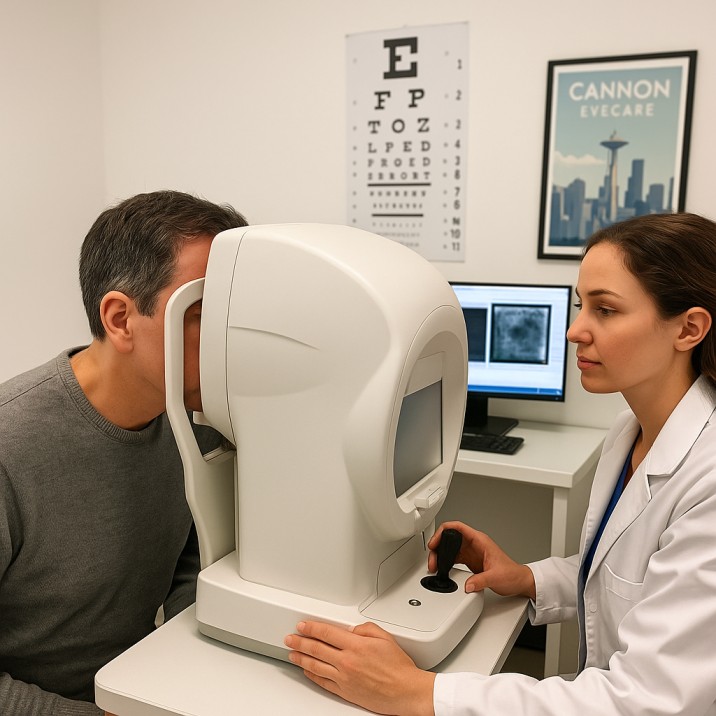Peripheral Vision Loss: Causes & Treatment in Seattle
What Is Peripheral Vision Loss?
Peripheral vision (or side vision) lets you see objects outside your direct line of sight. When diminished, everyday activities become challenging, like:
-
Spotting people or objects approaching from the side
-
Driving safely in Seattle traffic or at night
-
Navigating crowded places or new environments
This vision loss can appear suddenly or gradually in one or both eyes. Crucially, it’s not a disease – it signals underlying eye or neurological conditions.
Key Facts for Seattle Residents
-
Affects millions globally, especially adults 40+
-
Top Seattle risk factors: Age, diabetes, family eye disease history
-
Early detection at clinics like Cannon EyeCare often prevents permanent damage
What Causes Peripheral Vision Loss?
Peripheral vision loss stems from eye diseases, neurological issues, or vascular problems. Identifying the root cause is essential for proper treatment at Seattle clinics like Cannon EyeCare.
Common Causes in Seattle:
-
Glaucoma: #1 cause for adults 40+
High pressure silently damages optic nerves – early detection is vital -
Diabetic Retinopathy:
Diabetes-driven retinal vessel damage (critical for Seattle’s at-risk population) -
Retinal Detachment:
Sudden vision shifts = MEDICAL EMERGENCY – seek immediate Seattle eye care -
Retinitis Pigmentosa:
Genetic conditions often start in youth.
Neurological & Vascular Triggers:
-
Stroke: Affects the brain’s vision-processing areas
-
Brain Tumors/Injury: Compresses visual pathways
-
Migraine Aura: Temporary blind spots during headaches
Spotting Peripheral Vision Loss: Key Symptoms & Seattle Action Steps
Early signs often creep in subtly. You might notice:
-
Tunnel vision (like wearing horse blinders)
-
Frequent tripping on Seattle sidewalks or stairs
-
Night driving struggles on rainy roads
-
Bumping into objects in crowded Pike Place Market
-
Missing side movements during sports
When Seattle Residents Should Seek Help:
🟢 Gradual changes? → Schedule a comprehensive exam at Cannon EyeCare
🔴 SUDDEN vision loss? → Call our Seattle clinic immediately or go to ER
How We Diagnose Peripheral Vision Loss in Seattle
Early detection at Cannon EyeCare preserves sight through:
-
Visual Field Testing
Maps your side vision range -
Advanced OCT Imaging
*3D scans of retina/optic nerve* -
Dilated Eye Exams
Detailed assessment of eye structures -
Health Risk Analysis
Diabetes/glaucoma screening for Seattle patients
Living with Peripheral Vision Loss: Practical Seattle Strategies
Adjusting to reduced side vision is challenging, but Seattle offers robust support. Start with these adaptations:
Home & Navigation Safety
-
Prevent falls: Install motion-sensor lighting, and mark slippery Seattle porch stairs with bright tape.
-
Smart mobility: Use canes/service animals for Capitol Hill walks
-
Driving alternatives: Utilize Link Light Rail or King County Metro instead of night driving
Seattle-Specific Resources
-
Tech tools: Try free object-recognition apps at Seattle Public Library’s Low Vision Center
-
Community support: Join Washington Council of the Blind groups at Green Lake
-
Emotional wellness: Counseling for anxiety linked to navigating crowded places like Pike Place Market
Treatment Options at Cannon EyeCare
Medical & Surgical Solutions
-
Glaucoma: Customized Seattle treatment plans (drops → laser → surgery)
-
Retinal Emergencies: Same-day surgery coordination with UW Medicine
-
Diabetic Retinopathy: Laser/injection therapy – critical for Seattle’s diabetic community
Vision Rehabilitation
-
Occupational therapy: Master daily tasks (cooking, transit navigation)
-
Visual training: Maximize remaining sight with Cannon EyeCare therapists
Future Horizons (Under Research)
-
Gene therapy for inherited conditions
-
Retinal implants (currently in trials)
Prevention & Healthy Living: Protect Your Seattle Vision
Though some causes can’t be prevented, these proactive steps significantly reduce peripheral vision loss risks:
Seattle-Specific Prevention Plan
-
Priority Eye Exams
*Adults 40+: Get checked every 1-2 years at Cannon EyeCare*
*(Earlier if diabetic/hypertensive – affects 1 in 4 Seattle adults)* -
Chronic Condition Control
Partner with your Seattle doctor to manage:-
Diabetes (HbA1c <7%)
-
Hypertension (<120/80 mmHg)
-
High cholesterol
-
-
Daily Protection Essentials
-
Sunglasses year-round (Seattle’s UV exposure surprises many!)
-
Safety goggles for yardwork, sports, or waterfront activities
-
-
Northwest Wellness Habits
-
Eat kale/spinach + Pacific salmon (omega-3s)
-
Walk Green Lake trails 3x weekly
-
Avoid smoking – major glaucoma risk
-
FAQs
-
Early signs include bumping into objects, missing things from the side, trouble driving at night, and feeling like you’re looking through a tunnel




